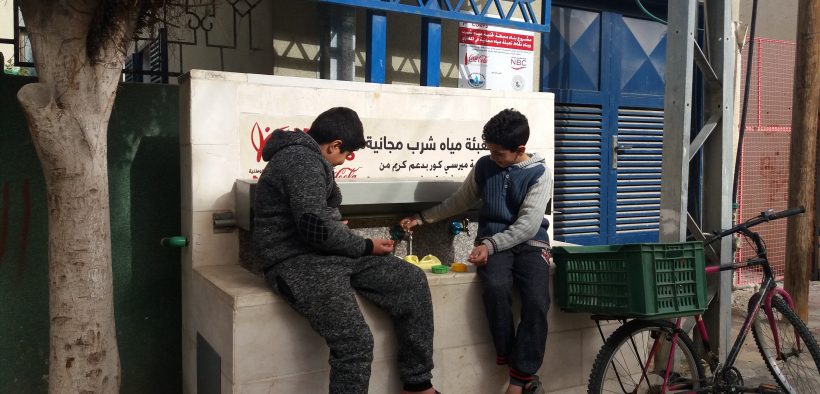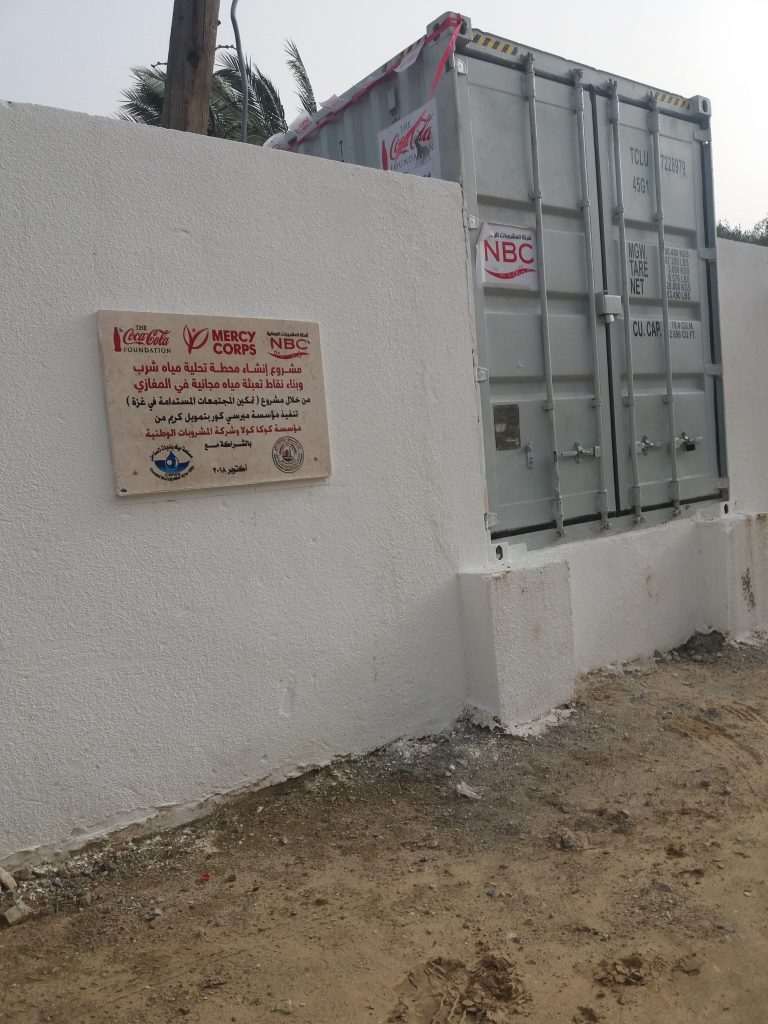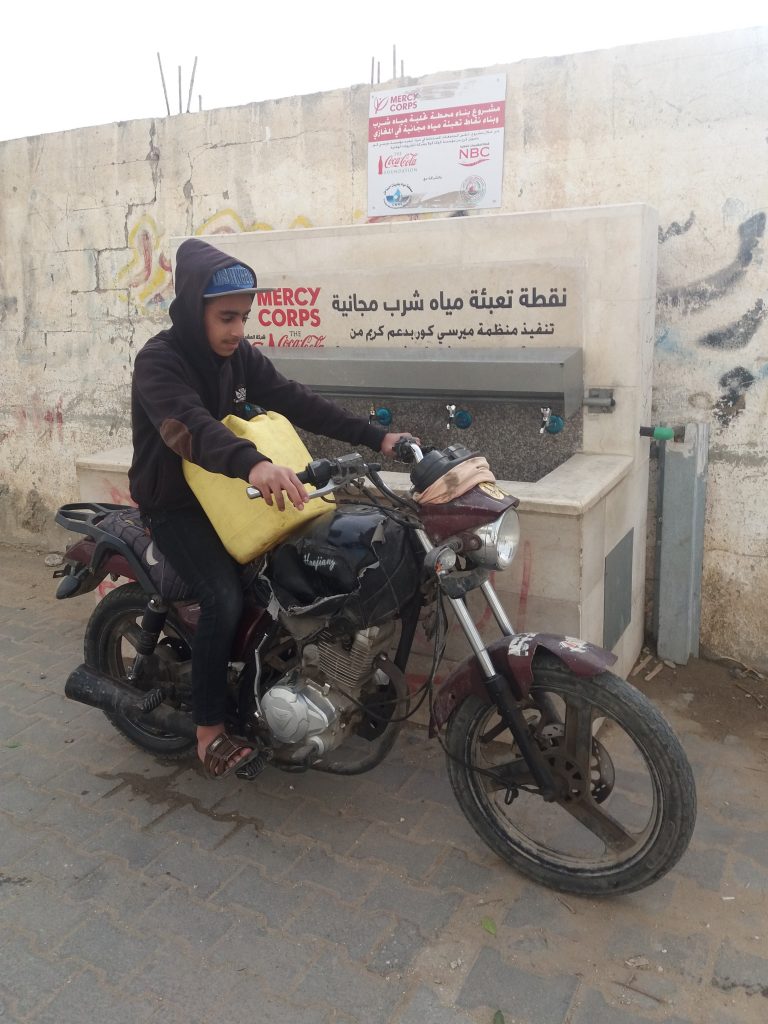A Refugee Camp in Gaza Finally Has Access to Free Clean Water

Water problems in Gaza have reached a crisis point in the past few years, with almost 90 percent of Gaza’s water undrinkable.
Mohammad Mahdi and his family, along with thousands other residents of the Maghazi refugee camp in the central Gaza Strip finally have access to clean water – free of charge.
In cooperation with international organizations, Maghazi’s municipal council has been able to install desalinated water filling points on streets throughout this crowded, decades-old refugee camp.
Much Easier Than Before
“Thanks should go to those who contributed to this project which is vital under current economic conditions in Gaza,” Mohammad Mahdi, a retired local UNRWA employee, told Citizen Truth.
“At midnight, I sent out my child to bring us some desalinated water from the filling point, right by the main mosque of Maghazi. Over the past 10 days, I have been unable to purchase clean water for my 14-member family and this has constituted a challenge. Yet with the help of such filling points, I have overcome the challenge and drinkable water is now available for my family, without any charge.”
Across the Maghazi refugee camp, home to almost 38,000 Palestinian refugees whose forebears were forced from their homes by violence or the fear of violence during the creation of the Israeli state in 1948, there are now 20 water filling station. Each 1.5 square-meter filling point has five taps.
Implementation
“We began constructing the filling points in November 2017, and were able to inaugurate them in November 2018,” Mohammad Alnajjar, mayor of Maghazi, told Citizen Truth. “They are now operating normally and people can use them quite easily and comfortably. We in the municipality of Maghazi have been taking care of the operation and maintenance.”

Location of the small desalination plant that feeds the water points. (Photo: Rami Almeghari)
Each filling station is connected via underground pipes to a small Italian-made desalination plant at an above ground water well, just east of the Maghazi refugee camp.
“In order to realize this project, we had first held a number of discussions with the donor party and seminars with representatives of the refugee camp’s community,” said the mayor.
“To avoid inflicting any damage to the streets and roads of the refugee camp, we decided to extend water pipes from the desalination plant right to the filling points. We were able to install a new underground water network for eight kilometers.”
Maintenance
The municipality is taking care of maintenance and providing for electricity supply.
“In fact, the maintenance will be done by us, but all spare parts and chemicals needed to run the desalination plant, will be provided by the donor party,” said engineer Ibrahim Alkhateeb, in charge of the water supply department at the Maghazi municipality.
“The plant produces 12 cubic meters an hour, when electricity supply is ongoing. In order to make sure that at least seven filling points operate when there is a power outage, we managed to place those filling points around local mosques, with water tanks placed by the mosques.
“The remaining filling points have water running only when the regular power supply is on. Due to financial restraints within the Maghazi municipality, we can not provide a fuel-run power generator to run the desalination plant. We have regular current from 8 to 10 hours a day, for the time being.”
The Donor

A local from Maghazi refugee camp, carrying a gallon of clean water from one of the clean water points in the Mghazi refugee camp. (Photo: Rami Almeghari)
The new desalination plant in Maghazi, along with the refill points and the supporting infrastructure, cost $250,000. The funds were provided by the Palestinian Coca-Cola company and the national company for beverages, based on a proposal submitted by the International Mercy Corps in Gaza.
“In the beginning, we had thought of supplying the clean desalinated water [ourselves] for households in the Maghazi refugee camp, but later we changed our minds, due to high costs,” said Khalid Elmezaini, a water and sanitation engineer with Mercy Corps.
“Benefiting from the funds provided by Coca-Cola and the national company for beverages, we decided to install these filling points, in co-operation with the Coastal Municipalities Water Utility and the Municipality of Maghazi.”
Elmezaini says the significance of the project lies in the fact that it has helped cut prices of clean desalinated water for camp residents. Each cubic meter of desalinated water usually costs between $7 and $8, which many people in Gaza simply can not afford.
“We are pleased to have made these filling points available and we look forward to implementing similar projects in other areas of the Gaza Strip,” Elmezaini told Citizen Truth. “Last but not least, we have supplied the CMWU with all spare parts and chemicals needed to run the new Maghazi-based desalination plant for a period of one year.”
Water problems in Gaza have reached a crisis point in the past few years, with almost 90 percent of Gaza’s water undrinkable, due to the intrusion of seawater into underground water reserves. There are now more than two million people living in the Gaza Strip, under the Israeli blockade.
Rapid population growth in the Gaza Strip has placed considerable pressure on natural resources, particularly water. Gaza relies almost entirely on groundwater, with 98 percent of its water supply coming from the Coastal Aquifer.
The remaining two percent is bought from Mekorot, the Israeli water company.
According to recent statistics released by the Gaza-based Popular Committee for Breaking the Israeli Siege of Gaza, around 85 percent of Gaza’s population lives under the poverty line, while the average individual daily income is less than $2 per day.
“I am here, filling water bottles,” said 12-year-old Feras Alsalloul. “I have a family of six. Before this station was installed, I used to fill water bottles from my grandfather’s house and sometimes, we would get water from the nearby Alfalah mosque. Every couple of days, we fill 20 liters of desalinated water.”















